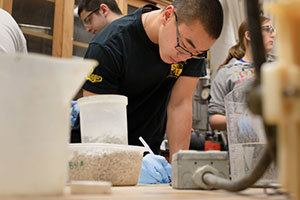
Peter Kilpatrick, Matthew H. McCloskey Dean of the College of Engineering at the University of Notre Dame, was in attendance Monday (March 23) as a letter of commitment was presented to President Barack Obama, announcing that 122 U.S. engineering schools plan to educate a new generation of engineers expressly equipped to tackle some of the most pressing issues facing society in the 21st century.
These “Grand Challenges,” identified through initiatives such as the White House Strategy for American Innovation, the National Academy of Engineering (NAE) Grand Challenges for Engineering and the United Nations Millennium Development Goals, include complex yet critical goals such as engineering better medicines, making solar energy even more cost-competitive, securing cyberspace and advancing personalized learning tools to deliver better education to more individuals.
Each of the 122 signing schools has pledged to graduate a minimum of 20 students per year who have been specially prepared to lead the way in solving such large-scale problems, with the goal of training more than 20,000 formally recognized “Grand Challenge Scholar Engineers” over the next decade.
More than a quarter of the nation’s engineering schools are now committed to establishing programs to educate engineers to take on the Grand Challenges for Engineering.
Grand Challenge Engineers will be trained through special programs at each institution that integrate five educational elements: a hands-on research or design project connected to the Grand Challenges; interdisciplinary experiential learning with clients and mentors; entrepreneurship and innovation experience; global and cross-cultural perspectives; and service-learning.
The training model was inspired by the National Academy of Engineering-endorsed Grand Challenge Scholars Program (GCSP), established in 2009 by Duke’s Pratt School of Engineering, Olin College and the University of Southern California’s Viterbi School of Engineering in response to the NAE’s 14 Grand Challenges for Engineering in the 21st century. Twenty active GCSP participants and more than 160 NAE-designated Grand Challenge Scholars have graduated to date. Half of the graduates are women — compared with just 19 percent of U.S. undergraduate engineering students — demonstrating the program’s appeal to groups typically underrepresented in engineering.
Other examples of GCSP participants working on Grand Challenges include Alex Caven at the State University of New York (SUNY), who is involved in efforts to provide access to clean water in Haiti; Stephanie Michaela Rickard, who is working on engineering better medicines at North Carolina State University; Allison Kindig at Iowa State, who is creating sustainable engineering projects in developing countries; and Olin College’s Luke Metz, who is engineering computerized writing aids to advance personalized learning.
Kilpatrick also moderated a session titled “Building Community Among GCSP Students and Building Community Among GCSP Alumni” that was held Tuesday (March 24) in conjunction with the White House event. It was one of four sessions focused on how to build community among all the Grand Challenges Scholar schools.
Many existing opportunities at Notre Dame will be leveraged to achieve the five GCSP curricular components. Students will be expected to develop a plan in advance based on the five components and then execute it over the course of their undergraduate careers.
Grand Challenge scholars at Notre Dame will be expected to perform undergraduate research that will lead to the completion of a senior thesis to help fulfill the requirements of the GCSP. The research topics will directly relate to either one of the 14 grand challenges or around one of the four Grand Challenge themes.
In terms of the interdisciplinary curriculum component, the College of Engineering will develop an institutionally tailored mechanism that thematically draws together the engineering and non-engineering curricular components of each student’s course of study. The expectation is for students to thoughtfully choose how they plan to address all of the challenge themes through careful selection of electives including technical and University courses, as well as enriching experiences such as study abroad and external competitions, such as the ASEE solar car competition.
The entrepreneurship component will be achieved in a number of ways including coursework and active participation in the Four Horsemen Society, a group committed to innovation in the sciences and engineering. The Integrated Business Practice Curriculum, which merges business courses into the engineering curriculum, may also serve as the foundation courses for achieving this objective.
The Global Dimension GCSP curricular component will be accomplished through participation in approved study abroad programs, including the International Summer Service Learning Program, and taking courses with a global perspective. More than 50 percent of all engineering students at Notre Dame now participate in some form of study, service and work abroad.
Any of the University’s approved service learning opportunities and any opportunities identified by students and approved by GCSP personnel will be used to meet the service learning curriculum component.
The Grand Challenge Scholars Program will provide an opportunity for all students to structure and “own” their engineering education and four-year experience at Notre Dame. The recruitment of Grand Challenge Scholars will begin as early as their admission into Notre Dame. Specifically, admitted students who are invited to apply and are accepted into the Engineering Scholars Program will also be accepted into the Grand Challenge Scholars Program provided that they show an interest in joining.
The First Year Engineering Course will also be extensively used to identify and generate interest in the program. This will be accomplished by making students aware of the Grand Challenges for Engineering and the tremendous progress already being made nationally.
“The College of Engineering at Notre Dame is delighted to be part of this important national initiative,” Kilpatrick said in commenting on the White House event. “The GCSP promises to help remake the face and motivation for engineering curricula both nationally and internationally.”
More information on the Grand Challenges initiative, including a copy of the letter of commitment, is available at www.nae.edu. The initiative grew out of a 2014 workshop organized by the American Association of Engineering Societies, Epicenter, Engineers Without Borders USA, EPICS and the NAE Grand Challenge Scholars Program.
Contact: Peter Kilpatrick, 574-631-5534, pkilpat1@nd.edu
Originally published by at news.nd.edu on March 24, 2015.